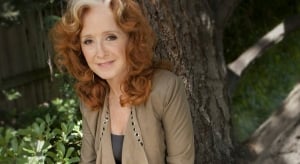
Sippie Wallace, 83, is a stout black woman whose heyday as a blues singer was in the 1920s. Bonnie Raitt, 32, is a lean, fast-living rock ‘n’ roller who travels in WASPy music circles in L.A. Sippie is a believing Baptist whose friends and contemporaries have included Fats Waller and Louis Armstrong. Bonnie, more devout in her liberal politics than in religion, numbers among her friends Jane Fonda, Jackson Browne and Graham Nash.
They have in common dazzling dimples, red hair (Sippie’s is store-bought), a fierce feeling for the blues and a spunky attitude summed up by a line from Mighty Tight Woman, a song written by Wallace that both have recorded: “There is nothing, nothing that I fear.” Raitt and Wallace are also close friends. “We are two souls who have known each other before,” says Bonnie. “It’s a connection that transcends age and space. She’s more my own grandma than my natural grandmother.” Sippie reciprocates, “I love Bonnie.”
The friendship will soon be reflected in the marketplace. Bonnie has a scorcher LP called Green Light that’s doing wheelies up the charts. Sippie, Wallace’s first recording in 16 years, has set off an industry buzz before its late-April release. Wallace has provided Bonnie with tunes over the years; Bonnie sat in on three tracks in Sippie’s new album.
Their camaraderie upholds a blues tradition of cross-generation ties that began in the early 1920s when blues queen Ma Rainey took under her wing a young singer named Bessie Smith. Yet the roads that brought Wallace and Raitt together could not have been more different. Sippie was born Beulah Thomas to a Houston Baptist deacon and his wife in 1898. She got her nickname because she had few teeth until she was 3 and had to sip everything she ate. At the Shiloh Baptist Church, she and several of her 12 siblings developed their musical skills. Sippie became an overnight success in 1923 when her debut record, Up the Country, sold more than 100,000 copies in the first three months.
Before long she was in great demand on the Theater Owners Booking Association black vaudeville circuit. (Its acronym led performers to describe it as “Tough on Black Asses.”) In 1927 she moved to Detroit with Matt Wallace, a professional gambler and her second husband. She has lived there ever since. After she cut 48 songs the Depression hit, and she did not record again until the blues revival of the mid-’40s.
It was around then, in 1949, when Broadway-Hollywood actor John (Pajama Game) Raitt and his wife, Marge, had daughter Bonnie. After graduating from a Quaker school in Poughkeepsie, N.Y., Bonnie went on to major in African studies at Radcliffe and join the folk/blues revival then beginning in Cambridge coffeehouses.
In 1965, meanwhile, a young blues buff named Ron Harwood discovered that Sippie Wallace was living in his hometown of Detroit, once again in obscurity. Besides becoming the historical expert on her career, Harwood, now an electrical contractor, gently lured Sippie back to performing and became her manager. Just as things were looking up, though, Sippie suffered a massive stroke in 1969. “It was six months before she could walk or talk,” recalls Harwood, “but the first thing she did was to play the piano.”
She was still in a wheelchair and recuperating in 1972. Raitt, by then performing on her own, had been impressed by Wallace’s picture on a record she happened to pick up in a London store in 1968. (“I saw the rhinestone glasses and the tiger-striped vest and said to myself, ‘This woman really knows how to dress.’ “) When she heard of Sippie’s recovery, Bonnie urged that she be invited to perform at the Ann Arbor Blues and Jazz Festival. Their duet on Sippie’s Women Be Wise (“Don’t advertise your man”) sealed their friendship.
Since then such gigs as the Newport Jazz Festival and royalties from Bonnie’s versions of her songs have helped support Sippie. Bonnie and others also raised some $45,000 to shoot a documentary—as yet unfinished—on her friend’s unusual life. “Sippie has always seen the struggle of the sexes with a sense of humor and compassion,” Raitt says. “She knows that freedom is the name of the game even though women have always had to answer to men.” Wallace says, of such songs as hex After I Was Loved My Eyes Flew Open Like an Electric Light, You Got to Know How and You Don’t Know My Mind, “There isn’t anything I sing about that hasn’t happened to me.”
This March 2 was declared Sippie Wallace Day in Detroit. The proclamation read: “[Her] life has been a moving drama of success and failure, heartbreak and pain, love and joy woven into the lyrics of her songs and expressed through her powerful, resonant voice.”
Sippie now lives with three great-grandnieces and a great-great-grand-niece in Harwood’s boyhood home in suburban Detroit. Her social life is centered on the Mount Prospect Missionary Baptist Church. Rev. Nathan Woods, her minister for 25 years, says, “Sippie has filled all categories in church except preaching.”
“The only time I have a church service is when I see Sippie,” confesses Bonnie. She was, however, one of the founding members of the antinuclear MUSE Foundation. She is also on the board of the Pacific Alliance, an umbrella organization concerned with a panoply of enviromental problems including water pollution and toxic-waste dumping. “I’ve always had two sides of me,” Bonnie once said. “One wanted to sing Bob Dylan protest songs and get good grades, and the other wanted to wear leather jackets and get laid.”
During the past two years Bonnie has frequently left her Hollywood Hills home to visit friends in a different music scene in Tulsa, Okla. “Sure, it’s Bible Belt country,” she says, “but musicians are musicians.” She will not cite one specific man in her life, but instead claims five—the members of her newly formed backup band. They will be traveling with Bonnie on the concert trail this year.
This summer she and Sippie expect to play some dates together. Wallace, who has diabetes but no lingering effects from her stroke, is sure she’ll be able to keep up with Bonnie. “If I was in the middle of dying,” she says, “and someone said, ‘Sippie, sing me a song,’ I’d stop dying to sing that song.”
About The Author
Source: © Copyright: People














 Visitors Today : 64
Visitors Today : 64 Now Online : 0
Now Online : 0















































































































